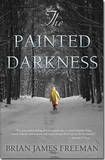The Painted Darkness / Brian James Freeman
 Cemetery Dance / December 2010
Cemetery Dance / December 2010
Reviewed by: Blu Gilliand
Brian James Freeman has gotten a lot of attention for the way he's gone about marketing his new book from Cemetery Dance, The Painted Darkness. In case you're one of the few who hasn't heard — he gave it away. Every word, available for free as a download. There was no gimmick. There was no agreement required that those downloading the file would turn around and purchase the physical book when it comes out in December. Hey, he even gave it to this reviewer twice — not long after I downloaded the electronic version, he was kind enough to send me an advanced copy of the printed product.
So, while we've heard a lot about the way Freeman is publicizing his work, we’ve yet to hear a lot about the work itself. I have no doubt that's going to change as we march closer to the publication date, and I'm happy to be among the first voices moving beyond the cry of "It's free!" and into the realm of "It's great!"
Because it is, you know. It's an ambitious piece of storytelling that delves not only into the mysterious act of creation itself – something that many in Freeman's audience will be able to relate to – to something we can all relate to: the crippling power of childhood fears. The fact that it does all this in quiet, understated tones reminiscent of the likes of Charles L. Grant makes it all the more amazing, moving and powerful.
Henry is a painter, living in an old rural farmhouse with his wife and young son. His attic is his workspace, and lately he's been spending a lot of time up there – even more than usual – painting canvases that he promptly turns to face the wall. He can't remember what he's painted on those, and for the time being it doesn't seem important. On this particular day, he's poised in front of another blank canvas, seeking that thin entryway into the state of semi-dreaming that he enters when he works. It's not coming easy, though, as there's more than art on his mind — his wife, upset at the amount of time he's been zoning out and working lately, took off with his son last night, and he hasn't heard from them since they left.
Eventually, though, he eases into work, only to be brought out of his reverie a few hours later as the boiler in the cellar begins making ominous sounds. As he breaks away from painting to take care of the boiler, Henry finds that the threads of a childhood memory are beginning to come back to him — a memory that ties right into the core of his artwork. Freeman presents that memory to us in a series of flashback chapters intercut with the chapters following present-day Henry, allowing us to discover the incident even as Henry is recovering its memory for the first time in his adult life.
In The Painted Darkness, Freeman is doing far more than telling a scary story (although he is telling a scary story, and doing it quite well). He's looking at the questions that all artists are frequently asked. Questions about where ideas come from, and whether something imaginary becomes real once the artist brings it to life. Writers in particular talk often about how their "real" and "imaginary" worlds blend together — how often have you heard writers say that their characters speak to them, or that they feel less like they're making something up and more like they're transcribing events that are really taking place? If characters in books seem real to readers, imagine how they must seem to the one that created them.
For Henry, the reality of his creations is even more, well, real than most. And as the events of this book unfold, both in the present-day sections and the flashback, we begin to understand how dangerous that reality is, and how important his work has become.
Freeman balances both narratives expertly, dovetailing them together at the end so that we are presented with one cohesive, impactful story. Jill Bauman contributes a series of black-and-white illustrations that perfectly convey the mood of the tale.
The Painted Darkness is a quick read, but it’s one that sinks in and stays with you for a while. Artists will have a special appreciation for Freeman’s views on the nature of creation, but anyone who has an appreciation for the work that artists do – not to mention the appreciation of a good old-fashioned spook story – will enjoy this book.
Purchase The Painted Darkness by Brian James Freeman.



